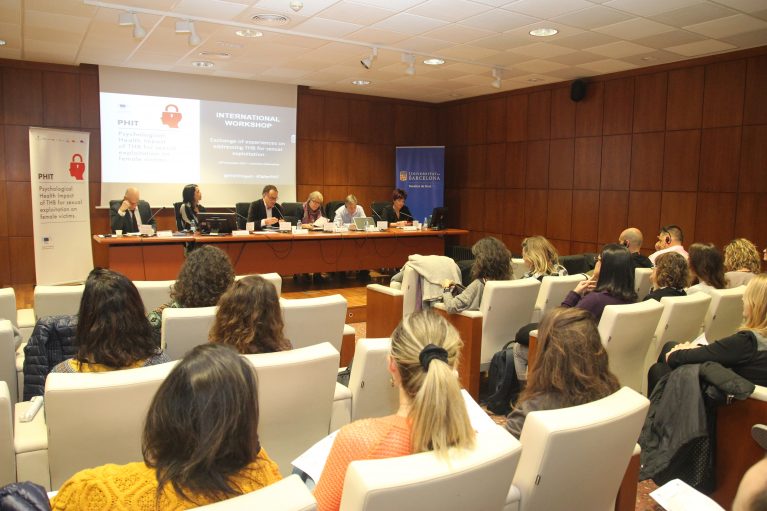On November 20th, PHIT Project organized its first International workshop on the psychological impact of trafficking in human beings for sexual exploitation.
Around 30 professionals from a variety of fields including healthcare, police, victims support or academics, gathered in the Faculty of Law of Barcelona University to take part to the event and to attend the presentations given by various specialists, including PHIT Steering committee members:
- Dr Helga Konrad, Head of the Regional Implementation Initiative on Preventing and Combating all Forms of Human Trafficking, Institute for the Danube Region and Central Europe (Austria)
- Dr Carrie Pemberton Ford, Director of the Cambridge Centre for Applied Research in Human Trafficking (United Kingdom)
- Pr Cornelius Katona, Medical and Research Director, Helen Bamber Foundation (United Kingdom)
The video footage (in English) of the workshop and the speakers’ presentations, are available on this link: https://uboc.ub.edu/portal/Play/48148501c4c14589b7aa857346bc72f31d
Executive summary of the workshop
The complex psychological trauma resulting from trafficking and exploitation
As explained by Alba Alfageme, a psychologist specialized in victimology, the actual experience of trafficking comes with a complex psychological trauma that in most cases has been aggravated by prior experiences of violence and abuse. The complexity of this trauma and the lack of specific knowledge on its nature make it difficult for professionals to attend THB victims.
The psychological condition of the woman when getting out of the trafficking situation and how she is being attended will largely determine the work of the police and the future proceeding of the case, as Xavier Cortés, head of the Unity of Trafficking in Human Beings of the Catalan police, highlighted. Moreover, the unawareness of the psychological state of the woman may exacerbate secondary victimization from stakeholders and judicial institutions. Therefore, the lack of knowledge regarding the survivor’s psychological trauma is particularly detrimental when her statement is being analyzed at the police station or in court. Very often, police and justice operators undermine the credibility of the victim’s statement, neglecting the fact that it was made in a particularly stressful context.
The need for a multilevel and transversal approach
Helga Konrad reminded that it is essential not to lose sight of the global picture of the phenomenon: human trafficking remains the most internationalized organized crime. Therefore she stressed that it is essential that the project results contribute to changing work procedures in all the fields and to giving visibility and sensitizing on human trafficking at local, national, European and international levels.
Carrie Pemberton Ford highlighted that an interdisciplinary and cross-sectional approach is absolutely needed to generate political change, while she presented her work as director of the Cambridge Centre for Applied Research in Human Trafficking.
Which intervention model should be implemented?: the case of Helen Bamber Foundation
Physical and psychological health issues of survivors almost always remain a secondary aspect of policies addressing THB for sexual exploitation in most countries, noted Helga Konrad.
For his part, Cornelius Katona presented the innovative therapeutical models that are being used at the Helen Bamber foundation (United-Kingdom) for victims of human cruelty. As a psychiatrist and expert in direct contact with survivors, he also highlighted the necessity to propose a therapy targeting the specific needs of victims of trafficking.
Video program
Link: https://uboc.ub.edu/portal/Play/48148501c4c14589b7aa857346bc72f31d
00:00:00 – 00:17:50: Inauguration and presentation of project PHIT, Markus González Beilfuss – Head of the project (17’50)
00:17:50: Project PHIT development and its practical implementations
00:17:50 – 00:46:00: Alba Alfageme Casanova – Research coordinator for PHIT (28’50)
00:46:00 – 1:22:10: Xavier Cortés Camacho – Head of the Unity of Trafficking in Human Beings, Mossos d’Esquadra – Catalan Police (36’10)
1:22:10: Debate (30’50)
1:53:00: International experiences on addressing THB for sexual exploitation
1:53:00 – 2:14:00: Helga Konrad – Head of the Regional Implementation Initiative on Preventing and Combating all Forms of Human Trafficking, Institute for the Danube Region and Central Europe (21′)
2:14:00 – 2:28:50: Carrie Pemberton Ford – Director of the Cambridge Centre for Applied Research in Human Trafficking (14’50)
2:29:25 – 2:50:08: Cornelius Katona – Medical and Research Director, Helen Bamber Foundation (20’43)
2:50:08: Debate (28’30)








